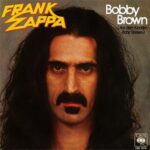 Frank Zappa was never one to do anything halfway. A composer, guitarist, and social satirist of unparalleled audacity, he spent decades challenging conventions, skewering hypocrisy, and blending musical genres with reckless ingenuity. Among his many incendiary creations, Bobby Brown Goes Down stands as perhaps the most notorious, infamous, and eyebrow-raising track in his vast catalog—a song that manages to be catchy, shocking, grotesque, and hilarious all at once. Listening to it is an experience equal parts moral minefield and infectious musical enjoyment, a paradox that only Zappa could pull off.
Frank Zappa was never one to do anything halfway. A composer, guitarist, and social satirist of unparalleled audacity, he spent decades challenging conventions, skewering hypocrisy, and blending musical genres with reckless ingenuity. Among his many incendiary creations, Bobby Brown Goes Down stands as perhaps the most notorious, infamous, and eyebrow-raising track in his vast catalog—a song that manages to be catchy, shocking, grotesque, and hilarious all at once. Listening to it is an experience equal parts moral minefield and infectious musical enjoyment, a paradox that only Zappa could pull off.
From the very first notes, it’s clear that you’re in Zappa territory: tight, clean instrumentation layered with pop sensibility, a hint of synth sparkle, and a beat that almost compels you to dance, even as your brain wrestles with the lyrical content. The juxtaposition is the key to the track’s brilliance: musically, it’s absurdly pleasant, toe-tapping, almost bubblegum in its accessibility; lyrically, it’s a nuclear explosion of satirical commentary, sexual frankness, and cultural critique. It’s Zappa’s gift to the listener—tricking you into a singalong before you fully comprehend the chaos that’s unfolding in the words.
The story begins with Bobby Brown, an archetype of American masculinity, the all-American boy-next-door who thinks he’s perfect. From the outset, Zappa is setting up a character study of hubris, ignorance, and entitlement. Bobby is everything that was culturally celebrated in late-1970s America: he’s popular, he’s arrogant, he’s self-assured, and he has a penchant for misogyny and objectifying women. Zappa’s genius is in how he allows the listener to root for him musically even as he horrifies us morally. That duality—the simultaneous attraction to and repulsion from the protagonist—is the heart of the song’s enduring fascination.
Musically, the track is deceptively smooth. The mid-tempo groove is clean and almost understated, providing the perfect vehicle for Zappa’s acerbic storytelling. The bassline is tight and deliberate, locking the rhythm into a pop-rock swing that feels almost innocuous on first listen. Layered atop this are keyboards and synthesizers, adding color and levity, giving the song a shiny veneer of commercial appeal. It’s almost as if Zappa deliberately dressed the song in a pop outfit, inviting listeners to engage before confronting them with lyrical madness. And then there’s Zappa’s vocals: charismatic, sardonic, and unapologetically theatrical, delivering each shocking line with a deadpan sincerity that amplifies the comedy while deepening the horror.
And oh, the lyrics. Bobby Brown Goes Down is infamous for a reason. Zappa spares no one, no cultural taboo is left untouched, and the satire cuts both wide and deep. Sexual politics, feminism, American privilege, homophobia, and self-delusion all get skewered in a matter of minutes. Bobby’s own delusions and fantasies are laid bare, exposing him as simultaneously ridiculous and grotesque. There’s a brilliance in Zappa’s ability to maintain the story’s rhythm while landing every barbed observation, every grotesque punchline, with precision. He creates a caricature so vivid, so exaggerated, that you can’t help but watch him flail through his own idiocy, propelled by the music’s irresistible momentum.
The track also demonstrates Zappa’s knack for blending genres and influences. There’s a clear nod to the slick pop of the late 1970s, hints of disco in the rhythm section, and even touches of jazz sophistication in the chord changes and melodic flourishes. This musical eclecticism is typical Zappa: he thrives on contradiction. The smooth, accessible groove contrasts beautifully with the abrasive lyrical content, creating tension that keeps the listener off-balance and fully engaged. It’s a kind of auditory trick, a musical sleight of hand: your body is dancing while your brain is cringing, and the combination is exhilarating.
One of the most fascinating aspects of the song is how it functions as social commentary, wrapped in humor so dark it’s almost absurdist. Zappa isn’t just telling a raunchy story for shock value—he’s exposing the contradictions and absurdities of his culture. Bobby Brown is the personification of self-delusion and entitlement, an extreme reflection of the societal archetypes Zappa found most laughable and most dangerous. And the genius is in how this critique is delivered: you might be singing along to the melody, tapping your foot, and then suddenly realize you’re complicit in observing—and laughing at—someone’s moral downfall. That’s Zappa’s audacious charm: entertaining, provocative, and morally uncomfortable all at once.
The track’s structure also contributes to its impact. It’s relatively short, clocking in at under four minutes, but Zappa packs it densely with narrative, musicality, and punchlines. There’s no wasted space; every note, every line, every inflection has purpose. The chorus is deceptively catchy, designed to lodge itself in your head while the verses unravel Bobby Brown’s character in increasingly absurd detail. It’s like musical storytelling on speed, a microcosm of Zappa’s larger satirical ambitions across his career.
Beyond the clever lyrics and musical virtuosity, the song is a testament to Zappa’s fearlessness. In an era where radio play often dictated the success of singles, he released a track that was virtually guaranteed to offend many listeners. There’s no compromise, no apology, and no attempt to sanitize the message. Instead, Zappa embraces provocation as an art form, using humor, exaggeration, and musical craft to make the biting social commentary both palatable and unforgettable. Listening to it, you sense the thrill of his audacity: this is someone who refuses to play it safe, someone willing to expose cultural absurdities in the most outrageous way imaginable.
Vocally, Zappa’s performance is a masterclass in tone and delivery. He adopts a conversational style that feels intimate, almost conspiratorial, inviting the listener into the absurd world of Bobby Brown. At the same time, his deadpan, sometimes sing-song phrasing highlights the ridiculousness of the subject matter. There’s a theatricality here that borders on vaudeville, a performative wink that makes the grotesque content both funny and mesmerizing. Supporting vocal flourishes, occasional backing harmonies, and subtle instrumental embellishments elevate the performance without distracting from the narrative.
One of the reasons Bobby Brown Goes Down continues to provoke discussion and fascination is its unflinching treatment of sexuality, identity, and hypocrisy. Zappa doesn’t shy away from uncomfortable topics; he embraces them as opportunities for critique, humor, and storytelling. The track exposes not just the character of Bobby Brown, but the broader societal tendencies he embodies. The humor is often dark, the sexual content explicit, and the satire razor-sharp. Yet the music—bright, polished, catchy—ensures that the track is never purely didactic or moralizing. It’s a high-wire act, walking the line between offense and entertainment with precision and confidence.
The production, too, is noteworthy. Zappa and his team crafted a crisp, polished sound that enhances the absurdity of the content. The rhythm section is tight, the synths shimmer, and the guitar lines are clean but playful. This sonic clarity allows the listener to focus on the lyrics, emphasizing the comedic timing and narrative twists. It’s an example of how Zappa’s musical genius lies not just in composition, but in his ability to manipulate tone, pacing, and arrangement to maximize both musicality and satire.
In terms of cultural impact, the song became one of Zappa’s most talked-about works, cementing his reputation as a provocateur unafraid to confront social norms with wit and audacity. It’s been simultaneously banned, celebrated, dissected, and laughed at—rarely ignored. And yet, beneath the shock value, there’s genuine musical craft: a memorable melody, inventive arrangement, and masterful storytelling that elevate it beyond mere novelty or controversy. The song endures because it’s funny, brilliant, and unflinchingly honest in its critique, all wrapped in a package that’s impossible to forget.
In conclusion, Bobby Brown Goes Down is quintessential Zappa: audacious, absurd, and brilliantly crafted. It combines satirical narrative, social commentary, musical virtuosity, and irreverent humor into a compact masterpiece. The track is a complex interplay of catchy pop sensibilities and uncomfortable truths, delivered with theatrical flair, wit, and precision. It’s a song that shocks, entertains, and provokes thought simultaneously, a testament to Zappa’s genius and fearlessness as an artist.
Listening to it today, one can’t help but marvel at the balance Zappa achieves: he forces you to dance, laugh, and reflect all at once. He exposes cultural hypocrisy, satirizes American masculinity, and constructs a melody so infectious it sticks in your head like glue. In short, Bobby Brown Goes Down is more than a song—it’s an experience, a lesson, and a demonstration of the unparalleled creativity of Frank Zappa.
Zappa reminds us, through the absurd exploits of Bobby Brown, that humor can be incisive, music can be confrontational, and satire can be danceable. And in the process, he crafts one of the most memorable, controversial, and funny tracks in his entire catalog—one that remains as provocative and brilliant today as it was when first unleashed.
Bobby Brown Goes Down is a masterclass in contradiction: catchy yet grotesque, playful yet ruthless, musical yet morally alarming. Only Frank Zappa could make something so shocking feel so effortlessly fun, and only he could turn social critique into a tune you might hum in the shower—if you dare.


